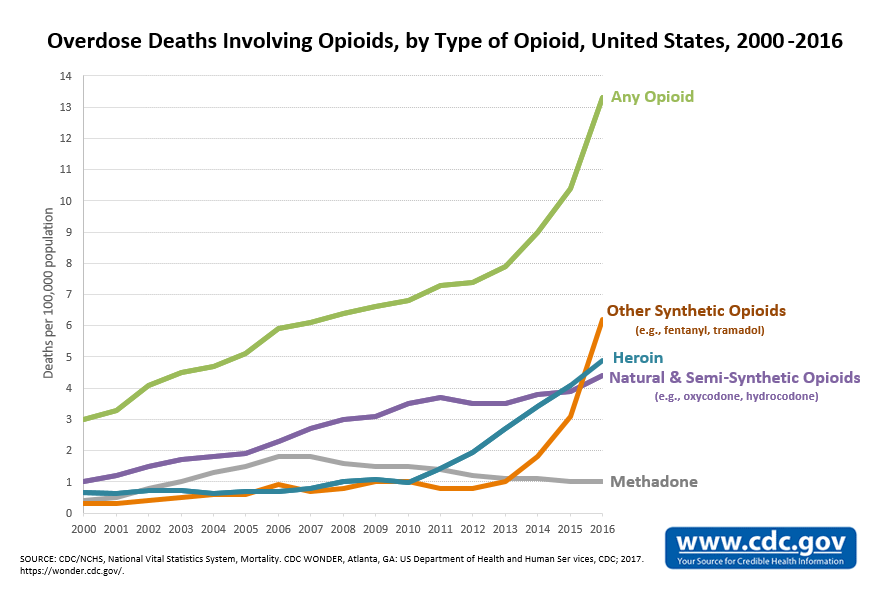President Trump returns to the “drug-infested den”
White House unveils plan to ‘crack down’ on hard-core drug traffickers
The graph seen above depicts the rapid growth of opioid-related deaths in the United States since the turn of the century. (Courtesy CDC)
April 5, 2018
According to the Center for Disease Control and Prevention, there were over 42,000 opioid-related deaths in America in 2016, a higher rate than has ever been seen before in the history of the United States.
One of the major issues being targeted by the Trump administration is the opioid crisis, which has been declared an epidemic by the CDC. A plan for how to deal with the epidemic has been in the works in the White House for quite some time now.
New Hampshire has the third-highest opioid-related death rate in the country, at 39 deaths per 1,000 people, just behind West Virginia and Ohio.
On Monday, March 19th, President Trump visited Manchester, New Hampshire, a city in the state which he previously called “a drug-infested den” according to National Public Radio, to unveil the White House’s plan for combating opioid-related deaths.
Manchester Central Fire Station is home to “Safe Station”, a new program which allows those struggling with addiction to seek help without fear of legal repercussions. Trump praised the program this past October.
The most scrutinized aspect of Trump’s plan was in regards to appropriate punishment for major drug traffickers.
“We will be focusing on the penalty that I have been talking about, previously, for the big pushers, the ones who are killing so many people–and that penalty is going to be the death penalty,” said President Trump on Monday morning.
The following morning, Attorney General Jeff Sessions released a memorandum to all US attorneys directing them to pursue the death penalty for certain drug-related crimes. This move by Sessions was unsurprisingly back by President Trump.
Reactions to this have ranged from angry and fearsome, to enthusiastic and supportive, all depending on what side of the aisle the opinion comes from. Students, as well as experts, have weighed in on this pressing issue.
“Personally, I think that enforcing the death penalty for drug-trafficking is too extreme. I agree that the punishment needs to be harsher in order to deter criminals, however, I think longer sentencing periods would be a more reasonable first step,” said senior Luke Groder.
“I do not think this is the right move for our government right now. We need to be spending our time and money developing treatment and care for those that suffer from addiction instead of developing a program that will take more lives than it saves,” said senior Casey White.
“This is too extreme. We tried inflicting harsher punishments during the crack cocaine epidemic of the 1980’s and it resulted in mass incarceration,” said senior Hannah Burd.
According to Americanprogress.org, the prison population in the United States grew 700 percent from 1970 to 2005. One in 15 African American men and 1 in 36 Hispanic men are incarcerated.
“(It) would be cruel and ineffective. It’s a cynical appeal to the worst instincts of his base,” said Executive Director Maria McFarland Sanchez-Moreno, of the Drug Policy Alliance.
“Imposing harsher penalties for drug sellers is hardly a new idea. The United States has decades of experience utilizing punitive tactics to confront drugs that have had a limited impact on substance use. In order to achieve a better balance in our approach to drugs, we need to invest more in proven methods of prevention and treatment,” said Executive Director Marc Mauer, of The Sentencing Project.
The president and his supporters have, of course, taken to Twitter to defend his actions.
“I appreciate @POTUS’s leadership & passion on this issue, and I welcome this plan,” tweeted Republican Representative Richard Hudson of North Carolina.
“Good to see @POTUS announcing that his administration will be taking this step. Educating children, and the public at large, on the dangers these drugs pose is a critical step,” tweeted Republican Representative David B. McKinley of West Virginia.
While in Manchester, the president also discussed what he believes to be a connection between nearby sanctuary cities such as Boston and Lawrence, and the opioid crisis in New Hampshire. During his speech, President Trump indicated that illegal immigrants are smuggling drugs from Mexico and are finding refuge in sanctuary cities and subsequently trafficking drugs in the area.
As a part of his speech, Trump called on one mother, who lost a child to fentanyl, to speak before the audience on the danger and severity of this particular epidemic. She talked of her son Adam, who she described as a great and smart kid, and how this disease can take anyone.
Over the course of his time as president, Trump will be working with current acting drug czar James Carroll, the CDC, and his first lady, Melania Trump, who has reportedly taken a particular interest in this issue, to attempt to deliver on these many promises.
During his visit, President Trump left many of the specific details of his plan, including possible legislation to be drafted, to be kept secret for the time being. He did, however, assure Americans that “failure is not an option,” adding, “addiction is not in our future.”



